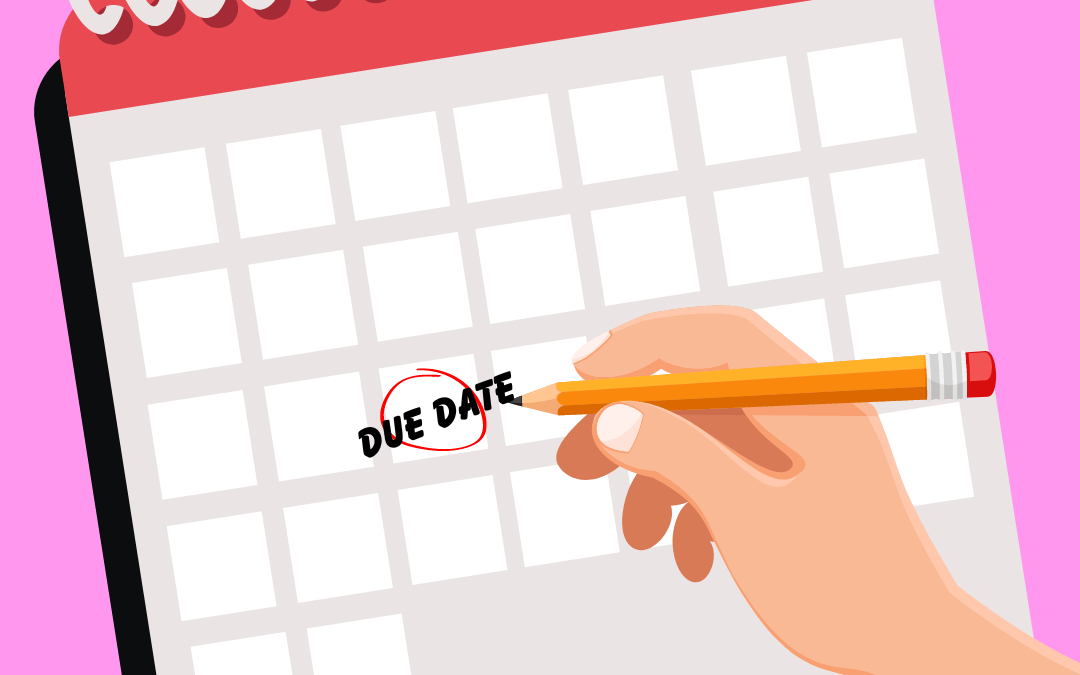The due date – the estimated date of arrival for your little one. Is it accurate? How is it calculated? Are ultrasounds accurate? You probably have a lot of questions about this even as you approach your due date. In this blog, we hope to give you a bit more information about all things due date.
Got some questions? Then let’s get going.
Estimated Due Date – it really is an estimate!
Before we get into the “what ifs” and the exceptions, let’s lay out what a typical pregnancy looks like. This is just to give us a baseline for how things will be explained to you by your healthcare professionals.
A typical pregnancy is estimated to be 40 weeks in length (280 days or the more generally those nine months that most of us are used to hearing). The due date is then calculated based on the first day of your last period. So, this means that your estimated due date (emphasis on estimated) is considered to be 40 weeks and 0 days after the first day of your last period.
A full-term pregnancy is considered to be 39-40 weeks. Basically, this is the point at which your baby has the best chance of being born happy and healthy.
This estimation method is based on something called Naegele’s Rule (derived from a German obstetrician Franz Karl Naegele’s theory) which comes with some problems but generally gives a decent estimate.
The calculations are as follows:
– Determine the first day of the last period the individual had. (Say you)
– Count back three months from that date
– Then with this new date add one year and one week
– You now have your estimated due date
This can be simplified somewhat but adding seven days to the first day of the last period and adding 9 months. This however is a more modern interpretation of the Naeglele rule that may not be in any way what the original method intended. Some online calculators will even ask for a potential date of conception.
There are some issues with this method, whichever way around someone uses it. The most obvious being that is assumes every woman has a perfect 28-day cycle and that once they find out they are pregnant they would easily and accurately recall the dates of their last period or the potential date of conception. It really is an estimate.
The alternative to using this rule is through the use of an ultrasound. Ultrasounds are more accurate of course but they aren’t entirely fool proof as there is still room for error. You will get your best estimate within your first trimester if you are using an ultrasound.
Babies are often born earlier or later than their due date. In fact, only 4% of babies are born on their due date. For a bit more detail here is a breakdown of the weeks:
37-38 weeks – Early Term
39-40 weeks – Full term
41-42 weeks – Later term
42+ weeks – Post term
Most pregnancies naturally last between 37-42 weeks and this is referred to as “term pregnancy”.
Why do we estimate the due date?
For something that isn’t an exact science and is often off by weeks, we do hear a lot about due dates. Why do we need them? What are they used for?
Of course, it is nice to know when your little one might make an appearance, just so you can get mentally and physically prepared for them. However, there are some more medical reasons to at least estimate a due date.
– Baby’s growth and development – knowing how far along you are, even as an estimate, will help doctors track whether your baby is growing and growing well.
– Testing – certain tests need to be done at certain stages during pregnancy.
– The prenatal care – obviously things change as your baby grows so knowing when they might arrive means you and your doctors can ensure you are receiving the right care at the right stage of your pregnancy.
If you are in any way concerned about going into labour early or going over your due date, talk to your doctor or a midwife.
Be prepared
As you approach the end of your pregnancy it is always better to be ready. Have your birth plan sorted, hospital bag ready and by the door or all elements of your home birth lined up ready to go. That way you can drop everything at a moment’s notice the minute bubba decides to arrive.
Even with estimates, if things go smoothly and there are no complications, your baby will arrive as soon as they are ready. Talking to your doctor about it should help put your mind at ease, especially if you are “overdue” by a couple of days.
Request a Welcome Pack
Find out more about cord blood banking by downloading a Welcome Pack now.









